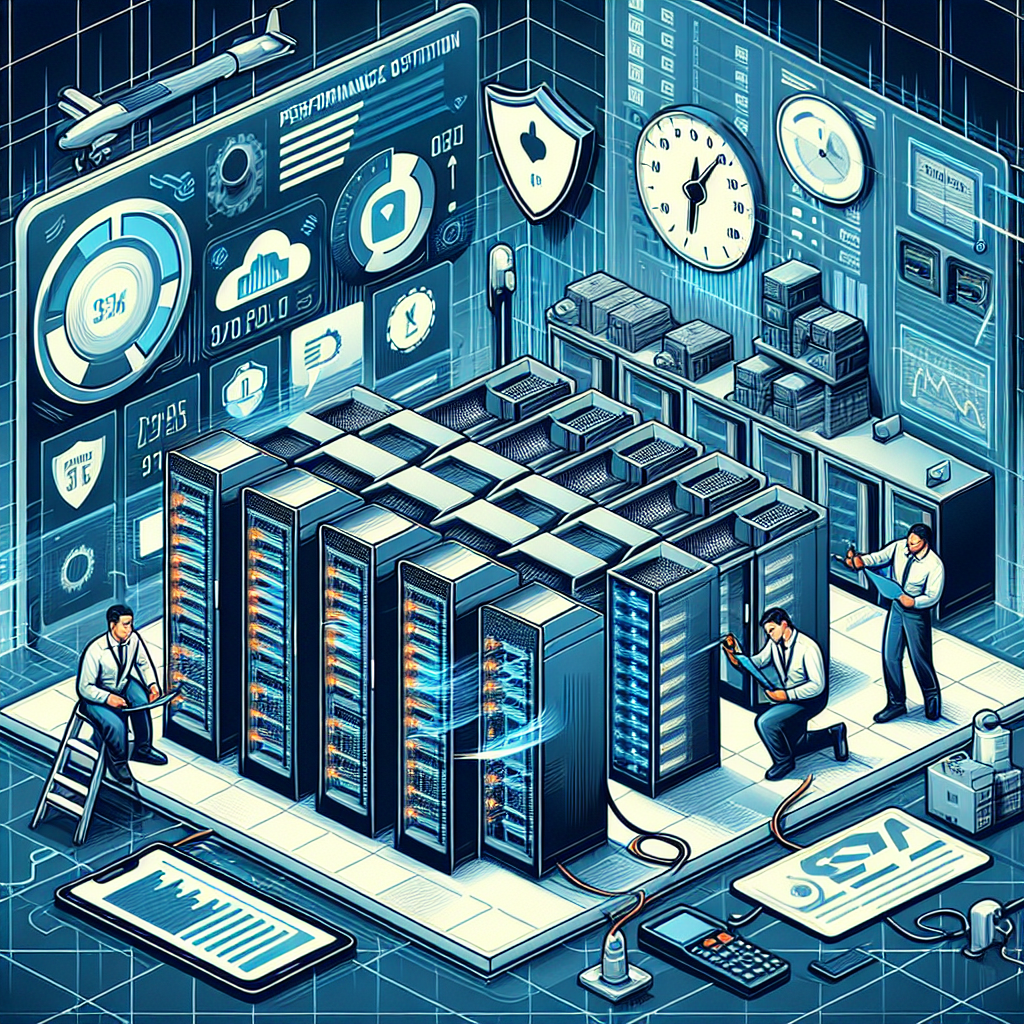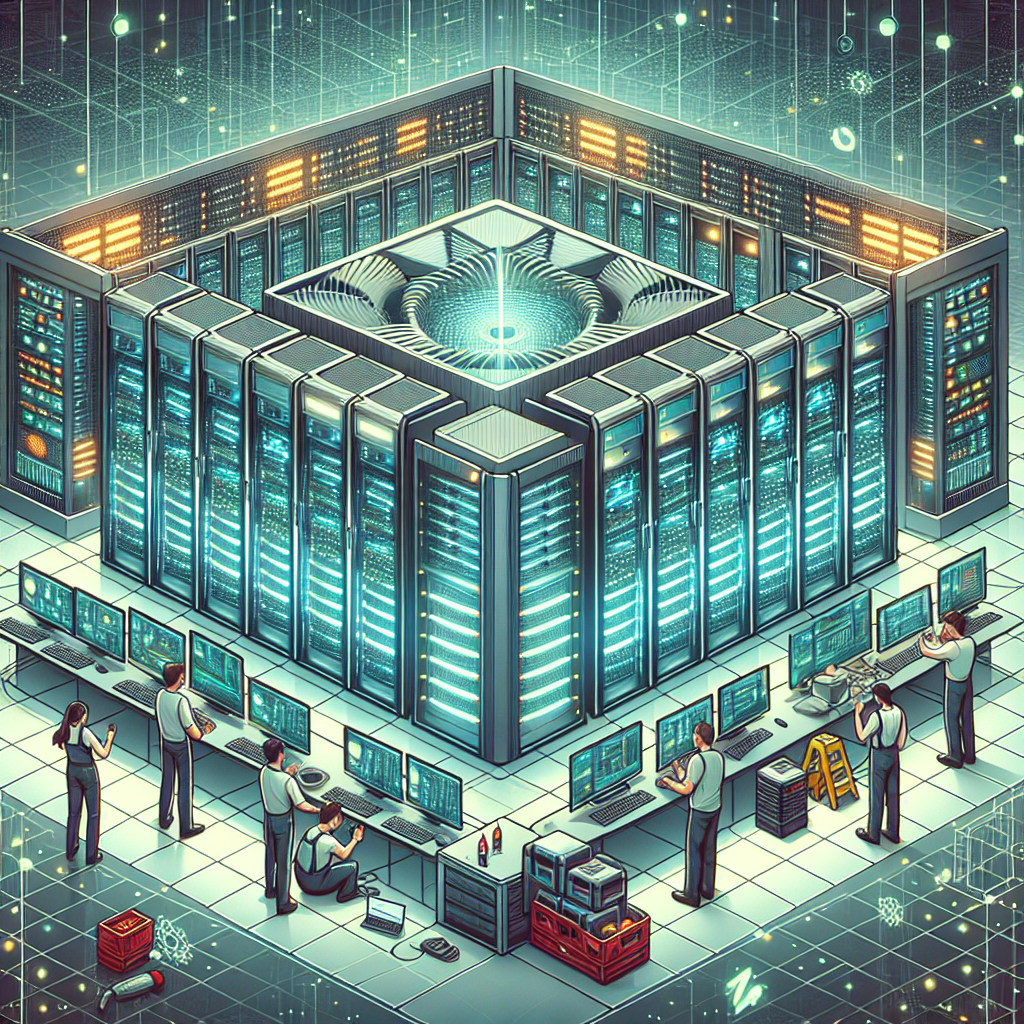Your cart is currently empty!
Tag: Performance

The Importance of Data Center Facilities Management: Ensuring Optimal Performance and Efficiency
Data centers play a crucial role in the modern digital world, serving as the backbone of countless businesses and organizations. These facilities house and manage the critical infrastructure needed to support the operation of servers, storage devices, networking equipment, and other IT components. To ensure optimal performance and efficiency, data center facilities management is essential.Facilities management encompasses a range of tasks and responsibilities that are vital to the smooth operation of a data center. This includes everything from ensuring the physical security of the facility to maintaining the proper environmental conditions for the equipment housed within. By effectively managing these aspects, data center operators can minimize downtime, improve energy efficiency, and maximize the lifespan of their equipment.
One of the key responsibilities of data center facilities management is maintaining the proper temperature and humidity levels within the facility. IT equipment is sensitive to fluctuations in temperature and humidity, and failure to maintain the ideal conditions can result in equipment failure and downtime. By monitoring and controlling these factors, facilities managers can ensure that the equipment operates at its peak performance levels.
Another important aspect of data center facilities management is ensuring the physical security of the facility. Data centers house a wealth of sensitive information and valuable equipment, making them a prime target for theft and vandalism. By implementing security measures such as access control systems, surveillance cameras, and security guards, facilities managers can protect the facility and prevent unauthorized access.
In addition to these tasks, data center facilities management also involves regular maintenance and upkeep of the equipment housed within the facility. This includes tasks such as cleaning the equipment, replacing worn-out components, and performing routine inspections to identify potential issues before they escalate into major problems. By staying on top of maintenance tasks, facilities managers can prolong the lifespan of the equipment and reduce the risk of unexpected downtime.
Overall, data center facilities management is essential for ensuring the optimal performance and efficiency of a data center. By effectively managing the physical environment, security, and maintenance of the facility, data center operators can minimize downtime, improve energy efficiency, and maximize the lifespan of their equipment. In today’s digital world, where data is king, the importance of data center facilities management cannot be overstated.

Maximizing Efficiency: Strategies for Data Center Performance Optimization
In today’s digital world, data centers play a crucial role in ensuring that businesses can operate efficiently and effectively. These facilities house the servers, storage, and networking equipment that store and process vast amounts of data. As demand for data processing and storage continues to grow, data center performance optimization has become increasingly important.Maximizing efficiency in a data center is essential for reducing costs, improving performance, and ensuring that the facility can meet the demands of its users. There are several strategies that organizations can implement to optimize the performance of their data centers.
One key strategy for data center performance optimization is to regularly monitor and analyze the facility’s energy usage. By tracking energy consumption and identifying areas of inefficiency, organizations can implement measures to reduce power usage and lower operating costs. This can include implementing energy-efficient hardware, optimizing cooling systems, and using virtualization technology to consolidate servers and reduce power consumption.
Another important strategy for maximizing efficiency in a data center is to optimize the layout and design of the facility. By organizing servers and networking equipment in a way that minimizes the distance data must travel between components, organizations can reduce latency and improve performance. Additionally, implementing hot and cold aisle containment systems can help to improve airflow and reduce cooling costs.
In addition to optimizing energy usage and facility layout, organizations can also improve data center performance by implementing automation and monitoring tools. Automation can help to streamline processes, reduce human error, and improve overall efficiency. Monitoring tools can provide real-time insights into the performance of the data center, allowing organizations to identify and address issues before they impact operations.
Ultimately, maximizing efficiency in a data center requires a holistic approach that considers energy usage, facility layout, automation, and monitoring. By implementing these strategies, organizations can improve performance, reduce costs, and ensure that their data center can meet the growing demands of their business. Data center performance optimization is essential for organizations looking to stay competitive in today’s fast-paced digital world.

The Importance of Regular Data Center Servicing: Ensuring Optimal Performance and Security
Data centers are the backbone of modern businesses, serving as the central hub for storing, processing, and managing vast amounts of digital information. With the increasing reliance on technology and data-driven decision making, the importance of regular data center servicing cannot be overstated.Ensuring optimal performance and security of a data center is essential for maintaining the efficiency and effectiveness of a company’s operations. Regular servicing helps to identify and address potential issues before they escalate into major problems that could disrupt business operations or compromise sensitive information.
One of the key benefits of regular data center servicing is the optimization of equipment performance. Over time, hardware components such as servers, storage devices, and networking equipment can degrade or become outdated, resulting in decreased efficiency and reliability. By conducting routine maintenance and upgrades, organizations can ensure that their data center infrastructure is running at peak performance levels, maximizing productivity and minimizing downtime.
In addition to performance optimization, regular servicing also plays a critical role in enhancing data center security. With the increasing prevalence of cyber threats and data breaches, it is essential for organizations to implement robust security measures to protect their sensitive information. Regular servicing helps to identify vulnerabilities in the data center infrastructure, such as outdated software, misconfigured settings, or unauthorized access points, and take proactive steps to address them before they are exploited by malicious actors.
Furthermore, regular servicing can also help organizations comply with regulatory requirements and industry standards related to data security and privacy. By conducting regular audits and assessments, organizations can ensure that their data center infrastructure meets the necessary compliance standards, reducing the risk of potential fines or penalties for non-compliance.
Overall, the importance of regular data center servicing cannot be overstated. By investing in routine maintenance and upgrades, organizations can ensure that their data center infrastructure remains secure, reliable, and efficient, enabling them to leverage the power of data to drive business success. To learn more about how regular servicing can benefit your organization, contact a reputable data center service provider today.

The Importance of Data Center Monitoring: Ensuring Optimal Performance and Security
In today’s digital age, data centers play a crucial role in storing, processing, and managing vast amounts of information for businesses and organizations. With the increasing reliance on technology and the exponential growth of data, it has become more important than ever to monitor and manage data center performance and security effectively.Data center monitoring is the process of tracking, analyzing, and managing the performance and security of a data center infrastructure. This includes monitoring server health, network traffic, power consumption, cooling systems, and overall data center operations. By continuously monitoring these key metrics, organizations can ensure that their data center operates at optimal performance and remains secure from potential threats.
One of the primary reasons why data center monitoring is essential is to prevent downtime. Downtime can be incredibly costly for businesses, resulting in lost revenue, damaged reputation, and decreased productivity. By monitoring the performance of servers, storage systems, and network infrastructure, IT teams can proactively identify and address issues before they escalate into major outages.
Furthermore, data center monitoring is crucial for ensuring data security. With the increasing frequency and sophistication of cyber attacks, organizations must be vigilant in monitoring their data center infrastructure for any signs of unauthorized access or suspicious activity. By monitoring network traffic, system logs, and security alerts, IT teams can quickly detect and respond to potential security breaches.
In addition to preventing downtime and enhancing security, data center monitoring also helps organizations optimize resource utilization and improve overall efficiency. By monitoring power consumption, cooling systems, and server utilization, organizations can identify opportunities to reduce energy costs, streamline operations, and maximize the performance of their data center infrastructure.
Overall, data center monitoring is a critical component of modern IT operations. By continuously monitoring and managing data center performance and security, organizations can ensure that their data center operates at peak efficiency, remains secure from potential threats, and delivers the reliability and performance needed to support their business operations. Investing in robust data center monitoring solutions is essential for any organization looking to stay ahead in today’s fast-paced and data-driven business environment.

The Importance of Regular Data Center Inspections: Ensuring Optimal Performance and Security
Data centers are the backbone of modern businesses, providing the infrastructure necessary to store, process, and manage critical information. With the increasing reliance on digital technology, the importance of data centers cannot be overstated. However, despite their crucial role, data centers are often overlooked when it comes to maintenance and inspections.Regular data center inspections are essential to ensure optimal performance and security. By conducting routine checks and assessments, businesses can identify potential issues before they escalate into major problems. This proactive approach not only helps prevent costly downtime but also ensures that data center operations run smoothly and efficiently.
One of the key reasons why regular inspections are important is to maintain the integrity of the data center’s infrastructure. Over time, equipment and systems can degrade or malfunction, leading to potential failures. By inspecting critical components such as servers, cooling systems, and power supply units, businesses can address any issues promptly and prevent disruptions to their operations.
In addition to maintaining optimal performance, regular inspections also play a crucial role in ensuring the security of the data center. With cyber threats on the rise, it is more important than ever for businesses to protect their sensitive information. By conducting thorough security audits and assessments, businesses can identify vulnerabilities and weaknesses in their data center’s security measures and take appropriate action to mitigate risks.
Furthermore, regular inspections can also help businesses comply with industry regulations and standards. Many industries, such as healthcare and finance, have strict data security requirements that businesses must adhere to. By conducting regular inspections and audits, businesses can demonstrate their commitment to maintaining a secure and compliant data center environment.
Overall, regular data center inspections are essential for businesses to ensure optimal performance and security. By proactively identifying and addressing potential issues, businesses can minimize downtime, protect their data, and comply with industry regulations. Investing in regular inspections is a small price to pay for the peace of mind that comes with knowing that your data center is operating at its best.

The Importance of Data Center Reactive Maintenance: Ensuring Optimal Performance and Reliability
Data centers are the backbone of modern technology, serving as the central hub for storing, processing, and distributing data. These facilities are critical to the operations of businesses, organizations, and even individuals who rely on the seamless functioning of their digital infrastructure. To ensure optimal performance and reliability, data center reactive maintenance plays a crucial role.Reactive maintenance refers to the practice of addressing issues as they arise, rather than proactively preventing them. While proactive maintenance is important in preventing potential problems, reactive maintenance is equally essential in responding swiftly to unexpected issues that can disrupt the operation of a data center.
The importance of data center reactive maintenance cannot be overstated. In a fast-paced digital environment where downtime can result in significant financial losses and damage to reputation, swift response to issues is essential. By promptly addressing issues as they arise, data center operators can prevent minor problems from escalating into major outages that can have far-reaching consequences.
One of the key benefits of reactive maintenance is its ability to minimize downtime. When an issue occurs in a data center, every minute of downtime can result in lost revenue and productivity. By responding quickly and efficiently to issues, data center operators can minimize the impact of disruptions and ensure that operations are restored as soon as possible.
Reactive maintenance also plays a crucial role in maintaining the reliability of a data center. By promptly addressing issues, operators can prevent them from recurring and ensure that the facility operates at peak performance. This not only enhances the overall efficiency of the data center but also helps to build trust with clients and users who rely on the facility to store and process their data.
In addition to minimizing downtime and ensuring reliability, reactive maintenance also helps to extend the lifespan of data center equipment. By promptly addressing issues and conducting repairs as needed, operators can prevent equipment from deteriorating and ensure that it continues to function effectively for years to come.
Overall, the importance of data center reactive maintenance cannot be underestimated. By responding swiftly to issues, minimizing downtime, ensuring reliability, and extending the lifespan of equipment, operators can ensure that their data center operates at optimal performance and remains a reliable and efficient hub for storing and processing data. In today’s digital age, where data is king, reactive maintenance is a critical component of maintaining a successful data center operation.
